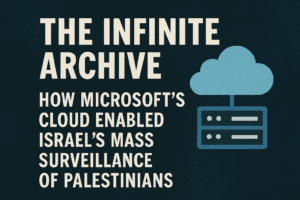The Infinite Archive: How Microsoft’s Cloud Enabled Israel’s Mass Surveillance of Palestinians
Microsoft’s Azure cloud enabled Israel’s Unit 8200 to store and analyze “a million calls an hour” from Palestinians in Gaza and the West Bank, creating a vast surveillance archive used to justify detentions, blackmail, and airstrikes. Leaked documents confirm Microsoft engineers custom-built secure Azure partitions for this data—stored in EU datacenters—despite the company’s public denials of involvement in targeting. The system marked a shift to population-wide espionage, allowing retroactive targeting of civilians based on old recordings.
While Microsoft claims ignorance and bans lethal use, Unit 8200 sources admitted the data directly fueled deadly operations in Gaza. This partnership exposes how commercial cloud infrastructure, sold as “infinite storage,” became a weaponized tool of occupation—sparking employee protests and ethical crises about tech’s role in modern warfare.

The Infinite Archive: How Microsoft’s Cloud Enabled Israel’s Mass Surveillance of Palestinians
Beyond Headlines: The Unchecked Power of Tech-Military Partnerships
The Core Revelation
In 2021, Israeli military intelligence (Unit 8200) and Microsoft CEO Satya Nadella agreed to a landmark deal: A custom-secured zone within Microsoft’s Azure cloud would store vast troves of intercepted Palestinian communications. By 2022, this system was operational—processing “a million calls an hour” from Gaza and the West Bank. The data, housed in Microsoft’s European datacenters (primarily the Netherlands), became a backbone for surveillance, target identification, and airstrike planning during Israel’s Gaza offensive.
Why This Isn’t Just “Another Surveillance Story”
The Scale Redefines Espionage
- Traditional surveillance targets specific suspects. This system captures entire populations, storing months of raw audio (200 million+ hours by 2025) for retroactive analysis. As one officer noted: “Suddenly the entire public was our enemy.”
- Human Cost: Unit 8200 sources admit data was used to blackmail Palestinians, justify detentions, or retroactively validate killings.
Microsoft’s “Plausible Deniability” Unravels
- Microsoft claims Nadella (who endorsed the project) was unaware of the data’s nature. Yet leaked documents show:
- Engineers designed enhanced security per Unit 8200’s specifications.
- Executives anticipated “hundreds of millions in revenue” and a “powerful brand moment.”
- Israel-based Microsoft staff (including Unit 8200 veterans) likely understood the intent.
- The Irony: Microsoft’s “external review” found no evidence of harmful use—even as intelligence sources confirmed its role in lethal airstrikes.
The Cloud’s Dark Transformation
- Unit 8200’s motto—*”The cloud is infinite storage”*—reveals a paradigm shift. Azure’s scalability allowed indiscriminate data hoarding impossible on local servers, enabling:
- Retroactive Targeting: Accessing past calls of newly deemed “threats.”
- Population-Wide Profiling: AI tools like “noisy message” scanned texts for “suspicious” words (e.g., mentions of weapons).
The Fallout: Accountability vs. Profit
- Ethical Contradictions: Microsoft forbade using Azure for “lethal targeting,” yet Unit 8200 used call data to research Gaza bombing targets.
- Tech’s Complicity Cycle: Similar to Project Nimbus (Google/Amazon’s $1.2B Israeli cloud deal), this exposes how infrastructure—not just weapons—fuels conflict.
- Whistleblowers & Workers Fight Back:
- Microsoft employees disrupted Nadella’s 2025 keynote, shouting: “How about you show how Israeli war crimes are powered by Azure?”
- Protests at Microsoft Build 2025 demanded: “No Azure for apartheid.”
The Unanswered Questions
- Did Europe Enable This? Data stored in the EU (Netherlands/Ireland) implicates regional governance failures.
- Why Did It Fail to Prevent October 7? The system’s much-touted “threat detection” collapsed pre-October 2023, raising doubts about mass surveillance’s efficacy.
- Who Regulates the Cloud? Azure’s “enhanced security” was co-designed with a military unit—blurring lines between commercial tech and warfare.
The Bottom Line: A Blueprint for Digital Occupation
This partnership isn’t just about Israel/Palestine. It sets a precedent: Cloud infrastructure can become a weapon when leased without guardrails. As militaries seek “infinite storage,” tech giants face a choice: enforce human rights due diligence or enable automated oppression. The call recordings in Azure’s European servers aren’t mere data—they’re artifacts of a surveillance regime that redefines occupation in the digital age.
You must be logged in to post a comment.